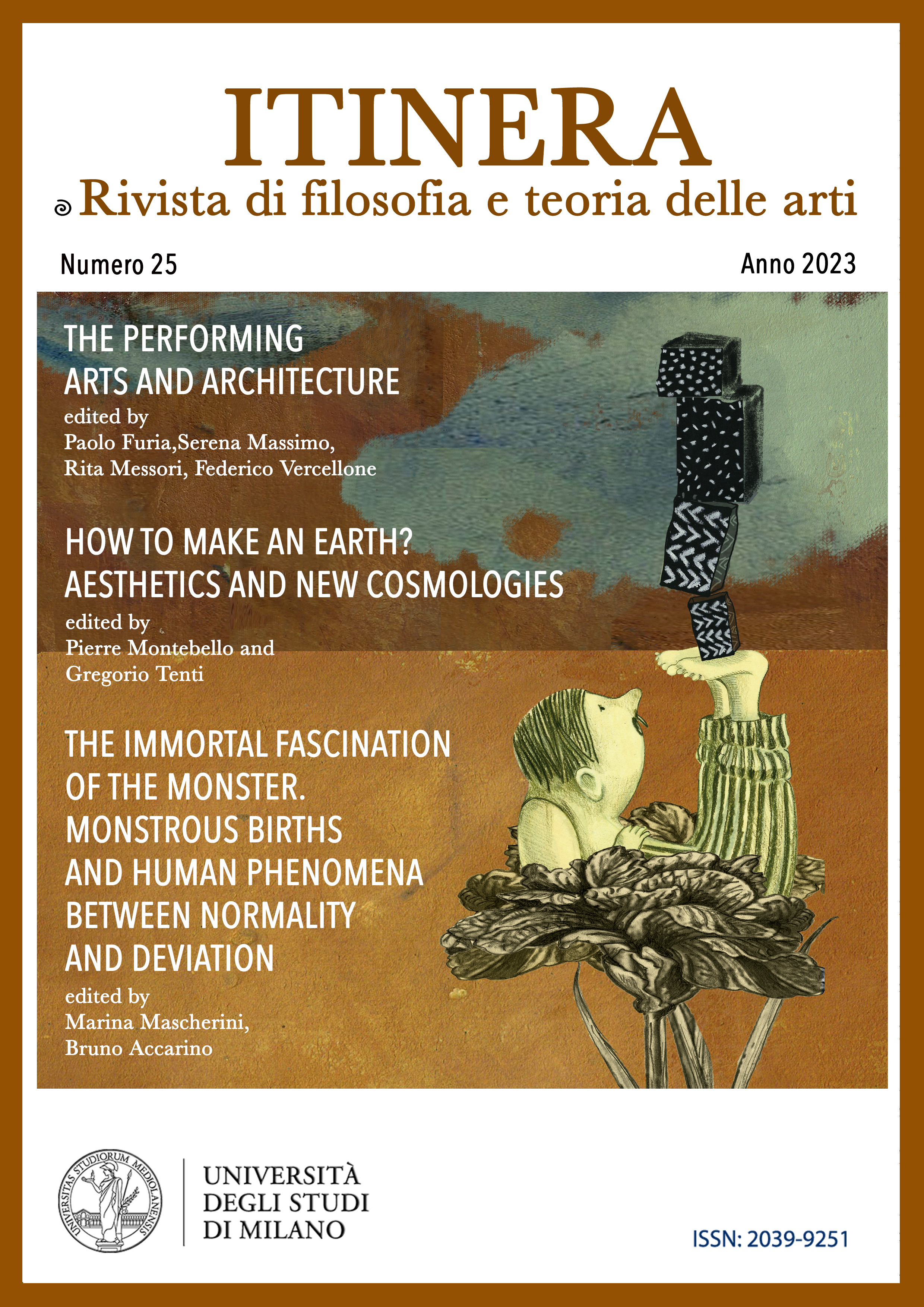Quando tutto comincia con uno spazio vuoto. Eutopia (2022) di Trickster-p o il gioco dell’Antropocene
DOI:
https://doi.org/10.54103/2039-9251/20820Parole chiave:
performing arts, game design, environmental humanities and crisis, participation.Abstract
The essay reflects on the installation-performance Eutopia (2022), conceived and directed by the Swiss-Italian collective Trickster-p, i.e. by Cristina Galbiati and Ilija Luginbühl in collaboration with game designer Pietro Polsinelli, Zeno Gabaglio for the sound space and Studio CCRZ for the graphic design. Eutopia addresses the environmental crisis we are becoming aware of with significant delay in raising cultural and political awareness to counteract the ongoing process of individual and collective removal. The essay inquires the theoretical assumptions on which this installation- performance is based and how it conveys the important message that inspired its creators to investigate how the performing arts can contribute to imagining the future of our planet. As a board game of the Anthropocene, Eutopia transforms the performative space into a political space in which people exchange and discuss ideas and visions about the environment and how to care for it actively.
Downloads
Riferimenti bibliografici
Armiero, M., L’era degli scarti. Cronache dal Wasteocene, la discarica globale, Einaudi, Torino 2021.
Bishop, B., Artificial Hells: Participatory Art and the Politics of Spectatorship, Verso, London-New York 2012.
Brook, P., Lo spazio vuoto, tr. it. di I. Imperiali, Bulzoni, Roma 1998.
Caleo, I., Performance e agire politico. Per una cura delle nuove istituzioni, in P. Di Matteo (a cura di), Performance e curatela, Luca Sossella, Bologna 2021.
Carlson, M., The Haunted Stage: Theatre as a Memory Machine, University of Michigan Press, Ann Arbor 2001.
Chaudhuri, U., AnthropoScenes: Enduring Performance, “Art in the Anthropocene”, Conferenza, Beckett Theatre, Trinity College, Dublino, 8 giugno 2019.
De Matteis, S., Introduzione all’edizione italiana, in V. Turner, Antropologia della performance, Il Mulino, Bologna 2014, pp. 7-22.
De Vita, Corpi d’acqua. La svolta idrofemminista di Astrida Neimanis, UniorPress, Napoli 2022.
Fischer-Lichte, E., Estetica del performativo. Una teoria del teatro e dell’arte, tr. it. di T. Gusman, Carocci, Roma 2014.
Franco, S., Giannachi, G. (a cura di), Moving Spaces. Enacting Dance, Performance, and the Digital in the Museum, Edizioni Ca’ Foscari, Venezia 2021.
Giannachi, G., Chi decide chi partecipa. Ripensare l’epistemologia della partecipazione, in “Connessioni remote”, 2, 202.
Gosh, A., La grande cecità. Il cambiamento climatico e l’impensabile, tr. it. A. Nadotti, N. Gobetti, , Neri Pozza, Vicenza 2017.
Haraway, D.J., Chthulucene. Sopravvivere su un pianeta infetto, tr. it di C. Durastanti, C. Cicconi, Nero Editions, Roma 2019.
Iovino, S., Prefazione. Studiare gli scenari dell’Antropocene, in D. Fargione, C. Concilio (a cura di), Antroposcenari. Sorie, paesaggi, ecologie, Il Mulino, Bologna 2018.
Lacoue-Labarthe, P., Sur le “Théatre des réalités”, in Id., Ecrits sur l’art, Les presses du réel, Dijon 2009.
Latour, B., La sfida di Gaia. Il nuovo regime climatico, tr. it di D. Caristina, Meltemi, Milano 2020.
Lavery, C. (a cura di), Performance and Ecology: What Can Theatre Do?, Routledge, London 2019.
Lepecki, A., Four Notes on Witnessing Performance in the Age of Dis-Experience, in D. Blanga-Gubbay, L. Kwakkenbos (a cura di), The Time we Share. Reflecting on and through Performing Arts, Kunstenfestivaldesarts, Bruxelles 2015.
Léfebvre, H., La produzione dello spazio, tr. it. di L. Ricci, Moizzi, Milano 1978.
Lorimer, H., Cultural Geography: The Busyness of Being ‘More-Than-Representational, in “Progress in Human Geography”, 29/1, 2005.
Massey, D., For Space, Sage Publications, London 2005.
McAuley, G., Space in Performance: Meaning Making in the Theatre, University of Michigan Press, Ann Arbor 2000.
Moore, J.W., Antropocene o capitalocene? Scenari di ecologia-mondo nella crisi planetaria, Ombre corte, Verona 2017.
Neimanis, A., Bodies of Water: Posthuman Feminist Phenomenology, Bloomsbury Academic, London 2017
Parekh, P., Gee, E., Tran, K., Aguilera, E., Pérez Cortés, L.E., Kessner, T., Siyahhan, S., Board Game Design: an Educational Tool for Understanding Environmental Issues, in “International Journal of Science Education”, 43/13, 2021.
Rancière, J., Lo spettatore emancipato, DeriveApprodi, Roma 2018.
Sacchi, A., Il teatro come forma che pensa. Pregiudizio antiteatrale, materialità e abiezione nella scena postdrammatica, in “Itinera”, 5, 2013.
Sheldrake, M., Entangled Life. How Fungi Make Our Worlds, Change Our Minds, and Shape our Futures, Random house Inc, New York 2020.
Soja, E.W., Thirdspace: Journeys to Los Angeles and Other Real-and-Imagined Places (1966), Wiley-Blackwell, Malden 2017.
Tsing, A.L., Il fungo alla fine del mondo. La possibilità di vivere nelle rovine del capitalismo, Keller, Rovereto 2021.
J. Westerman, The Dimensions of Performance, in https://www.tate.org.uk/research/publications/performance-at-tate/dimensions-of-performance.
Sitografia
https://www.trickster-p.ch/it/information.
https://www.tate.org.uk/research/publications/performance-at-tate/dimensions-of-performance.
https://www.facebook.com/luganolac/videos/338649891612446/.
Dowloads
Pubblicato
Versioni
- 2023-09-02 (4)
- 2023-08-29 (3)
- 2023-08-29 (2)
- 2023-08-08 (1)
Come citare
Fascicolo
Sezione
Licenza
Copyright (c) 2023 Susanne Franco

Questo lavoro è fornito con la licenza Creative Commons Attribuzione - Condividi allo stesso modo 4.0.
Gli autori che pubblicano su questa rivista accettano le seguenti condizioni:
1. Gli autori mantengono i diritti sulla loro opera e cedono alla rivista il diritto di prima pubblicazione dell'opera, contemporaneamente licenziata sotto una Licenza Creative Commons - Attribuzione - Condividi allo stesso modo 4.0 internazionale che permette ad altri di condividere l'opera indicando la paternità intellettuale e la prima pubblicazione su questa rivista.
2. Gli autori possono aderire ad altri accordi di licenza non esclusiva per la distribuzione della versione dell'opera pubblicata (es. depositarla in un archivio istituzionale o pubblicarla in una monografia), a patto di indicare che la prima pubblicazione è avvenuta su questa rivista.
3. Gli autori possono diffondere la loro opera online (es. in repository istituzionali o nel loro sito web) prima e durante il processo di submission, poiché può portare a scambi produttivi e aumentare le citazioni dell'opera pubblicata (Vedi The Effect of Open Access).





